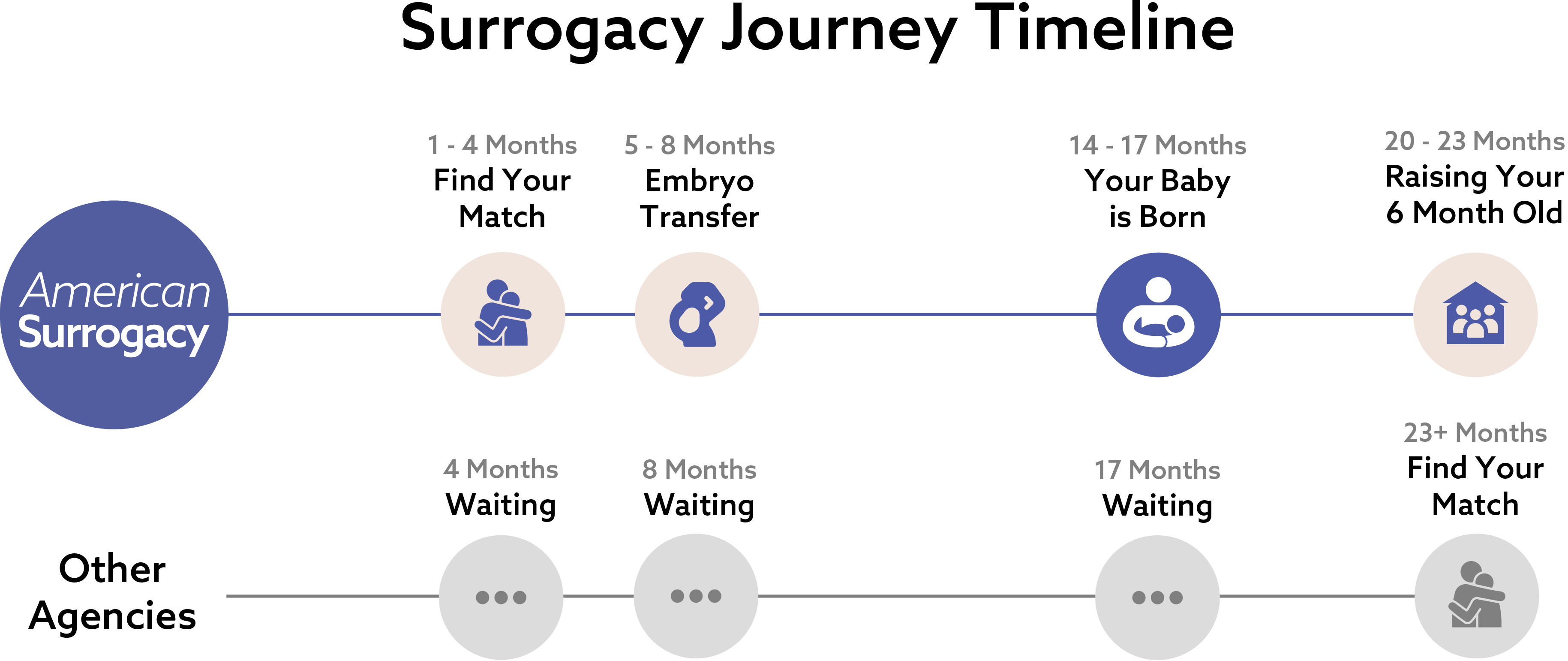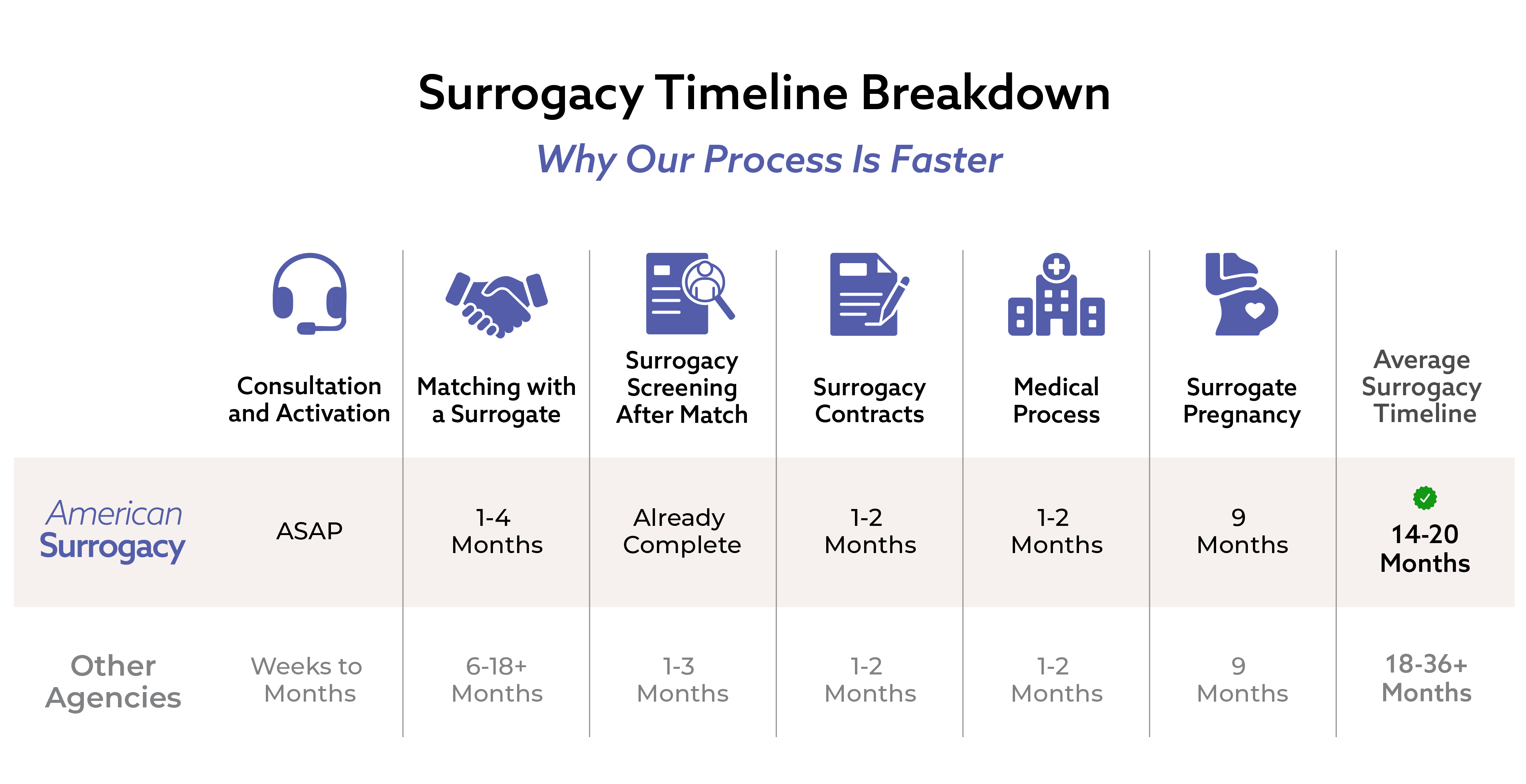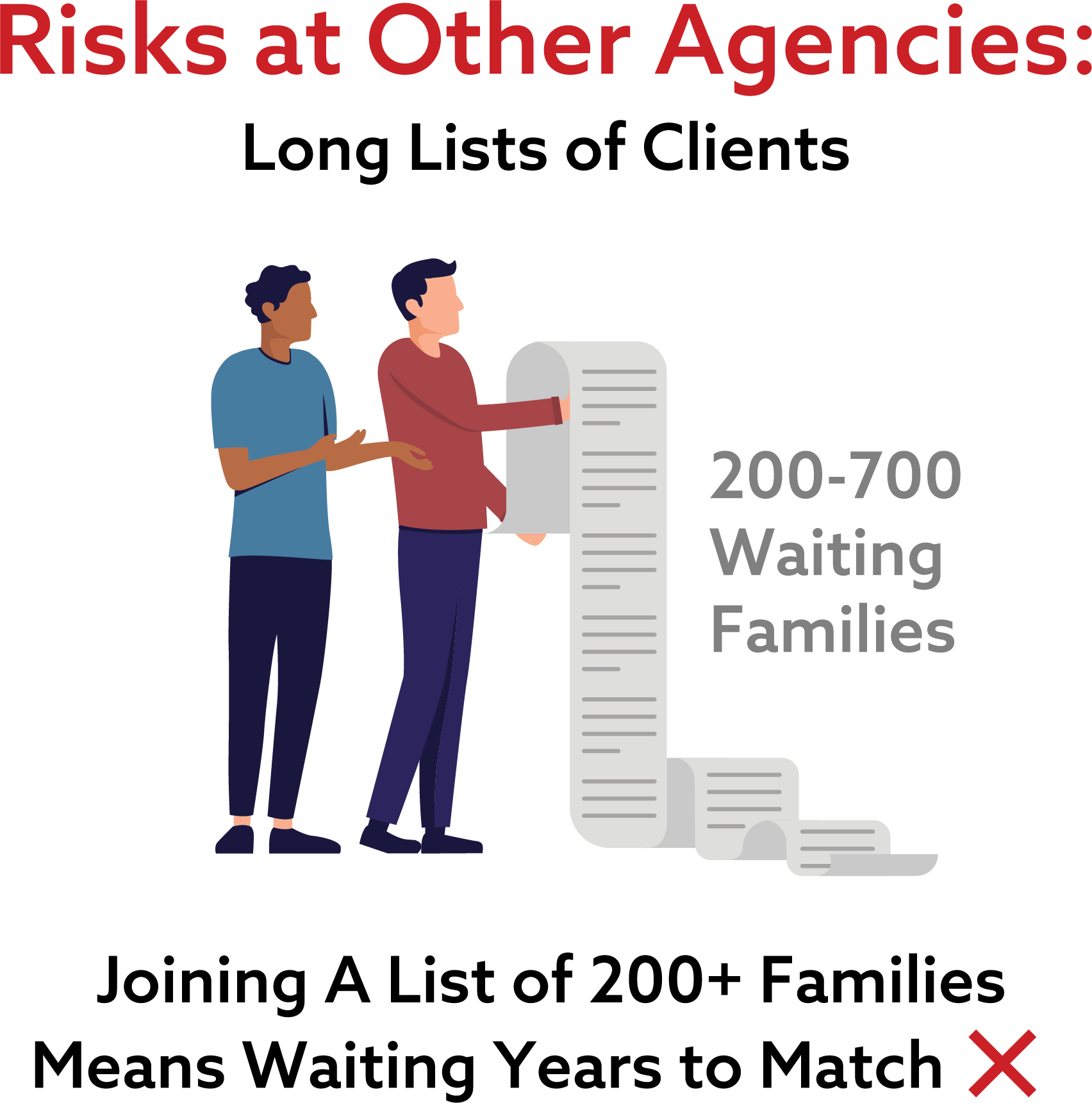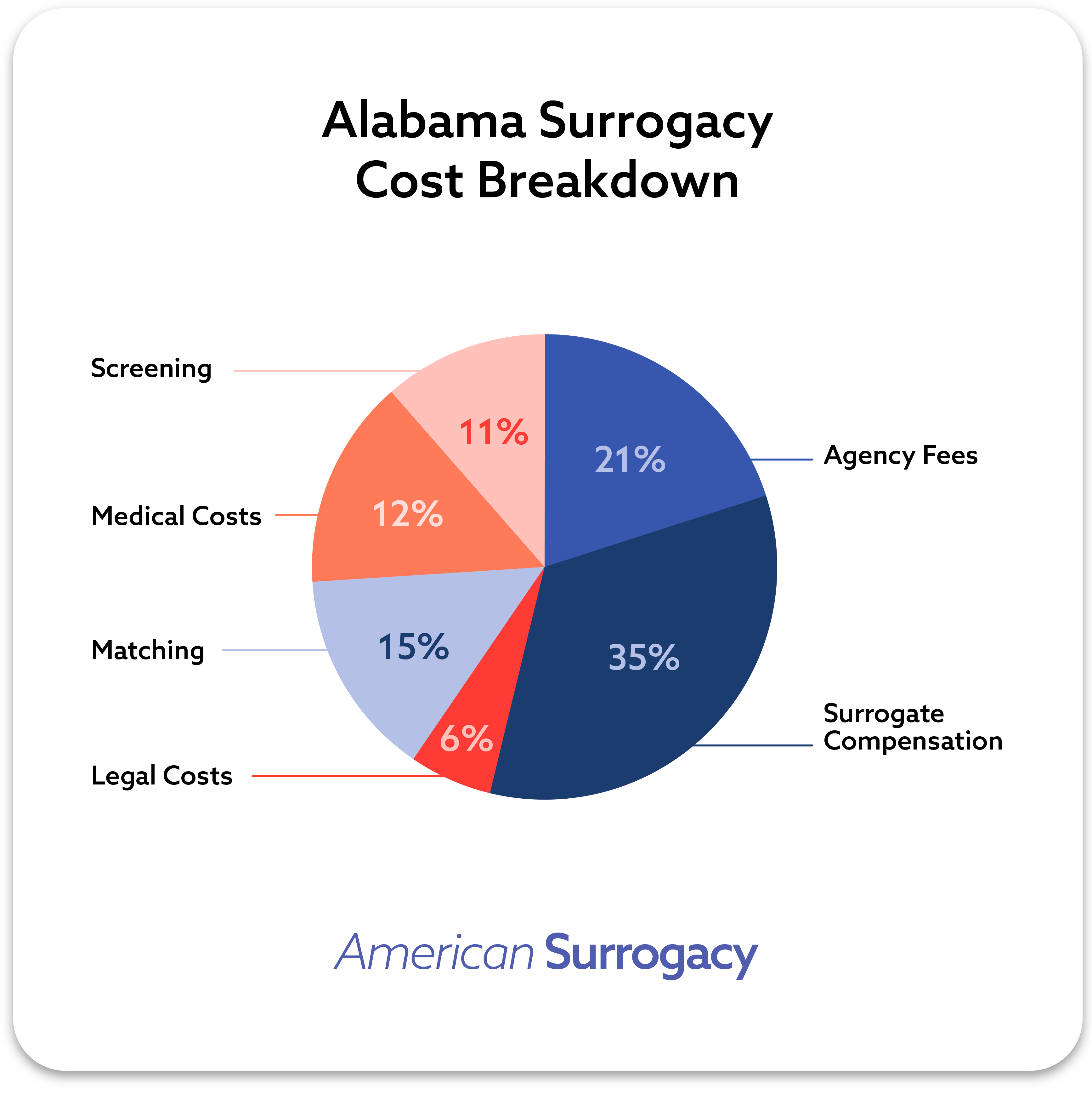Building a family through surrogacy in Alabama as an LGBT couple is absolutely possible—and you deserve the same protections as any intended parent. Alabama's courts have embraced modern families, consistently supporting LGBT surrogacy programs and granting parentage orders to same-sex couples across the state. With knowledgeable guidance and the right agency support, you'll navigate Alabama's surrogacy landscape with confidence.
Success depends on understanding how LGBT surrogacy laws actually work in Alabama, knowing which documents you'll need, and taking the right steps to secure parental rights from birth. Whether you're married, in a committed partnership, or pursuing single parenthood, Alabama's family courts have already helped thousands of LGBT families celebrate their babies' arrivals—and yours could be next.
Discover Your Path to Parenthood
Alabama Pre-Birth Orders for Same-Sex Couples: Legal Requirements and Success Rates
Picture walking into the hospital already recognized as the baby's parents. In Alabama, pre-birth orders aren't just possible for LGBT intended parents—they're routinely granted to same-sex couples who understand the system.
Alabama operates under common law principles rather than rigid surrogacy statutes, which actually works in favor of LGBT families. Judges exercise considerable discretion when reviewing pre-birth order petitions, and they've consistently championed LGBT families pursuing surrogacy in Alabama. This flexibility means each unique family situation gets individual consideration rather than checkbox treatment.
Four elements significantly increase the chances of obtaining a pre-birth order in Alabama:
- Marriage status: Married couples have the strongest position, especially when at least one partner has a genetic connection to the child
- Comprehensive contracts: Surrogacy agreements that clearly outline parental rights and intentions strengthen cases
- Experienced legal counsel: Attorneys experienced in LGBT surrogacy agencies and Alabama family law
- Medical documentation: Affidavits from fertility clinics confirming the gestational arrangement provide crucial supporting evidence
The pre-birth order process kicks off during the second trimester. An attorney files a petition with the court—either where the surrogate plans to deliver, where she lives, or in the intended parents' home county. Most Alabama counties require all parties to attend a hearing, but with experienced counsel, these proceedings are straightforward and affirming.
County Variations in Alabama LGBT Surrogacy Law Enforcement
While Alabama courts generally embrace LGBT families, some counties take a more conservative approach. Working with American Surrogacy ensures matching with surrogates in the most welcoming jurisdictions, setting families up for success from day one.
Non-Genetic Parent Rights in Alabama LGBT Surrogacy: Establishing Dual Parentage
Genetic connection to a child doesn't determine the right to be their parent. Alabama courts regularly name non-genetic parents as guardians in same-sex relationships, particularly when couples are married and have solid surrogacy agreements backing their intentions.
Alabama's approach to parental rights in LGBT surrogacy prioritizes intent over biology. When a gestational surrogacy agreement clearly establishes both partners as intended parents, Alabama recognizes that intent as binding—regardless of who contributed genetic material.

Rights for Male Same-Sex Couples Using Egg Donors
For male couples using an egg donor, the path forward is clear. The sperm provider gains automatic recognition as the biological father, while the partner becomes the second parent through the pre-birth order. Both get listed on the birth certificate without any adoption requirements.
Rights for Female Same-Sex Couples Using Sperm Donors
Female couples using a sperm donor follow a similar journey—the egg provider becomes the recognized biological mother, and the partner goes through the same pre-birth order process.
Strengthening Your Case for Dual Parentage Recognition
Cases become stronger with certain elements in place. A marriage certificate certainly helps, along with a detailed surrogacy contract that demonstrates shared intent to parent. Medical documentation of the gestational arrangement adds weight, as do psychological evaluations showing both partners are prepared for parenthood. The process mirrors what opposite-sex couples experience when using donor gametes, because Alabama courts recognize that modern families come in many forms.
Alabama Surrogacy Laws for Unmarried Same-Sex Couples: Three Legal Pathways
While married couples enjoy a smoother path to dual parentage, unmarried partners can still achieve the same recognition—it just requires smarter planning.
Alabama judges approach unmarried couples more cautiously, but that doesn't close doors. Countless unmarried LGBT couples have successfully established dual parentage by combining pre-birth recognition for the genetic parent with post-birth adoption for their partner.
Three solid paths exist for unmarried couples. The first option combines a pre-birth order for one partner with post-birth adoption—the genetically-related partner secures pre-birth parentage while the other completes a second-parent adoption after the baby arrives. Both achieve complete rights, though the timeline extends somewhat.
A second approach involves post-birth parentage orders for both partners. Here, both file for parentage recognition after birth by demonstrating shared intent through the surrogacy contract and supporting evidence. While this takes longer, both gain recognition simultaneously.
The third possibility might surprise many: common-law marriage recognition. If couples meet Alabama's common-law marriage requirements—cohabitation, mutual consent to marriage, and presenting publicly as spouses—courts may treat them as married. This opens up the same pre-birth order process that married couples enjoy.
Some couples choose to marry during their surrogacy process to streamline parentage establishment. Since Alabama recognizes marriages performed anywhere, couples can marry in any state and still benefit from married couples' advantages in Alabama surrogacy cases.
Single LGBT Parent Surrogacy in Alabama: Streamlined Legal Process Explained
Becoming a single parent through surrogacy might be easier than imagined. Alabama's courts particularly support single intended parents, often approving pre-birth orders more readily than for unmarried couples.
Single LGBT intended parents find Alabama's climate quite welcoming. Courts view single-parent surrogacy arrangements as uncomplicated since there's no question about competing parental claims or complex family dynamics. Whether using own genetic material or working with donors, the path to parentage follows clear, established precedents.
Genetic Connection Requirements for Single Parents
The process depends somewhat on genetic connection to the future child. When genetically related, pre-birth orders get approved almost universally. Single parents receive direct hospital discharge as the guardian, with the birth certificate issued in their name alone—no adoption or additional steps required.
Using Donor Gametes as a Single Parent
Even when using donor gametes, pre-birth orders remain readily accessible. Courts focus on clear intent to parent, as demonstrated in surrogacy contracts. Donor agreements must explicitly relinquish parental rights, and thorough medical documentation of the gestational arrangement is essential, particularly when understanding embryo laws by state.
Legal Advantages for Single Parents in Alabama
Single parents enjoy distinct advantages in Alabama's surrogacy process. They experience a streamlined court process with fewer variables, lower costs since only one parent needs representation, faster timelines from petition to final order, and zero potential conflicts between intended parents.
Choose a surrogate in an LGBT-friendly county, make sure the surrogacy contract explicitly establishes intent as the sole parent, work with an attorney experienced in single-parent cases, and consider backup plans if the preferred county presents unexpected challenges based on Alabama surrogacy requirements.
Many single parents worry about having less standing than couples, but Alabama courts actually find single-parent cases more straightforward to resolve. Clear intent to parent, supported by a comprehensive surrogacy agreement, creates an unshakeable foundation for parentage recognition.
Alabama Birth Certificates for LGBT Surrogacy: Parent Designations and Options
Picture opening that envelope and seeing both names listed exactly as desired. Alabama offers same-sex couples meaningful flexibility in how they're identified on their child's birth certificate, honoring family structure and personal preferences.
Alabama's vital records office has evolved with modern families, and same-sex parents typically appear as "Parent and Parent" on birth certificates. This inclusive language ensures both receive equal recognition without outdated assumptions about family roles.
Birth Certificate Designations by Family Type
Birth certificate options reflect each family's unique configuration. Male couples usually get listed as "Parent and Parent" or sometimes "Father and Father" depending on county, with the surrogate's name nowhere on the certificate and both genetic and non-genetic fathers receiving identical treatment. Female couples experience similar recognition, appearing as "Parent and Parent" or "Mother and Mother" in some areas, with equal treatment regardless of who provided the egg and no distinction between genetic and non-genetic parents.
County-Specific Birth Certificate Options
Different counties offer varying levels of flexibility. Some let couples specify "Mother," "Father," or "Parent" designations based on preferences, while urban areas tend to provide more terminology options and rural counties may default to standard "Parent and Parent" language.
Alabama's approach delivers a crucial advantage: both parents gain immediate recognition. Unlike states requiring second-parent adoption after birth, Alabama's birth certificates establish parentage from day one when proper pre-birth orders are in place. This document becomes the primary proof of parentage—essential for hospital discharge and medical decisions, insurance coverage for newborns, Social Security applications, and future school enrollment.
Alabama Birth Certificate Processing Times for LGBT Surrogacy Cases
Alabama won't leave families waiting weeks to prove they're their child's parents. The state processes birth certificates for surrogacy cases within 7-10 days of birth, sometimes faster when documentation is complete.
The timeline unfolds predictably: hospital staff receive the pre-birth order copy on delivery day, birth registration gets filed with vital records within 24-48 hours, vital records processes the application during days 3-5, and the final birth certificate becomes available for pickup or mailing by days 7-10.

Alabama offers expedited processing for families needing faster documentation. Rush processing costs an additional $25-50, with same-day processing sometimes possible for travel emergencies. Electronic copies may arrive faster than physical certificates, helping families who need immediate parentage proof.
Processing timelines depend on several factors. Complete documentation matters most—pre-birth orders with all required signatures process fastest. Urban counties often work more efficiently than rural areas, weekend or holiday births may create slight delays, and hospitals familiar with surrogacy cases navigate the administrative process more smoothly.
Request multiple certified copies when applying, since certified copies are needed for insurance, Social Security applications, and other official purposes. Getting extras upfront saves time and eliminates future processing delays. Most intended parents feel pleasantly surprised by Alabama's efficiency—the state's extensive experience with surrogacy cases has streamlined the entire administrative process.
Second Parent Adoption Requirements for LGBT Couples in Alabama Surrogacy
Most married LGBT couples with pre-birth orders avoid second parent adoption entirely—parental rights get fully established the moment their child is born.
Alabama's approach to LGBT surrogacy differs dramatically from states requiring automatic second-parent adoption. When couples secure a pre-birth order naming both parents, Alabama law recognizes the complete family without additional proceedings.
Second parent adoption becomes unnecessary in certain circumstances. Married couples with pre-birth orders naming both parents bypass this requirement entirely, single parents avoid it by definition since there's no second parent, and unmarried couples where both partners received pre-birth recognition also skip this additional step.
However, second parent adoption might be needed in certain situations. Unmarried couples where only one partner received pre-birth recognition may require this additional step, as might cases where pre-birth orders were denied and parentage is being established after birth. Families using out-of-state surrogates delivering in Alabama might also need extra steps if their home state mandates them.
When Alabama second parent adoption becomes necessary, the process involves certain requirements. A social worker conducts a home study evaluation of the family, followed by a court hearing where a judge reviews the adoption petition and supporting documents. Expect a waiting period of 30-60 days from filing to finalization, with costs adding $3,000-7,000 in attorney and court fees.
Pre-birth orders offer significant strategic advantages over adoption processes. Families gain immediate parental rights with no waiting period after birth, lower costs that avoid adoption fees and extended processes, simpler documentation where the birth certificate serves as primary proof, and streamlined insurance allowing both parents to add the baby to coverage immediately.
If living outside Alabama but the surrogate delivers there, verify the home state's recognition of Alabama pre-birth orders. Most states honor out-of-state parentage orders, though some may require additional confirmation based on surrogacy-friendly states policies. The goal remains securing the strongest position from birth, and working with attorneys experienced in surrogacy legal matters ensures choosing the path providing maximum protection with minimum complications.
Essential LGBT Protections in Alabama Surrogacy Contracts and Agreements
Surrogacy contracts aren't just paperwork—they're the blueprint protecting growing families before, during, and after pregnancy. In Alabama, where courts rely heavily on contract law principles for surrogacy decisions, agreements become the cornerstone of all parentage determinations.
Without specific surrogacy statutes, Alabama makes contracts the primary document defining everyone's rights and responsibilities. Courts examine these agreements to understand parental intentions, financial arrangements, and decision-making authority throughout pregnancy and birth.
Parental Rights Establishment in Contracts
Contracts must include essential LGBT-specific protections woven throughout. Parental rights establishment requires clear language naming both intended parents as guardians, specific provisions for pre-birth order proceedings, the surrogate's explicit consent to parentage transfer, and statements supporting both genetic and non-genetic parent rights.
Medical Decision-Making Authority Provisions
Medical decision-making authority provisions ensure intended parents can make medical decisions during pregnancy, establish hospital notification requirements and birth plan preferences, authorize medical consent for newborns, and create procedures for emergency medical situations.
Birth and Hospital Procedure Protections
Birth and hospital procedures need clear documentation, including the right to be present at delivery, hospital room assignments and overnight arrangements, immediate custody transfer protocols after birth, and the surrogate's acknowledgment of the intended parents' authority.
Financial and Legal Safeguards
Financial protections create security through clear compensation structure and payment timelines, responsibility for attorney fees where intended parents cover both sides, insurance coverage requirements and medical expense allocation, and breach of contract remedies with dispute resolution procedures outlined in comprehensive surrogacy contracts.
LGBT-Specific Contract Language
LGBT-specific language throughout agreements should include gender-neutral terminology, recognition of both parents regardless of genetic connection, non-discrimination clauses protecting against bias, and confidentiality provisions protecting family privacy.
Why Alabama Contracts Carry Extra Legal Weight
Alabama contracts carry exceptional weight for important reasons. Without statutory frameworks, contracts fill the void that legislation might otherwise occupy. Courts rely on contractual intent for parentage decisions, making agreements crucial to outcomes. Well-drafted contracts create favorable case law through precedent value, and Alabama courts readily enforce valid surrogacy agreements through established mechanisms.
Contract negotiation becomes crucial because Alabama judges often base decisions entirely on contractual language. Working with attorneys experienced in surrogacy laws by state ensures agreements meet Alabama's requirements while protecting the unique needs of LGBT families.
Specialized LGBT Surrogacy Support in Alabama: Agency Benefits and Success Rates
American Surrogacy could cut months off the surrogacy timeline while ensuring bulletproof protection. We specialize in LGBT surrogacy programs with a proven track record of guiding same-sex couples through Alabama's system successfully and efficiently.
Our LGBT-focused advantages begin with dramatically faster matching times—averaging 1-4 months compared to the industry standard of 6-18 months. This efficiency stems from our pre-screened surrogates who want to work with LGBT families, established relationships in LGBT-friendly Alabama counties, and streamlined processes that eliminate compatibility delays.
Other agencies often fall short in areas that matter most to LGBT families. Many have limited LGBT experience leading to complications and delays, use generic contracts that don't address same-sex couple needs, lack Alabama-focused knowledge, and provide inadequate surrogate screening for LGBT compatibility.

Our legal expertise provides comprehensive protection through our network of Alabama attorneys specializing in LGBT surrogacy law, pre-negotiated fees and streamlined contract processes, direct relationships with LGBT-friendly judges and court clerks, and extensive experience with county-specific variations.
Comprehensive support throughout the process includes dedicated case managers familiar with LGBT family building challenges, emotional support through all stages, insurance navigation assistance designed for same-sex couples, and 24/7 availability during pregnancy and delivery.
Our proven success record demonstrates real results for LGBT families. We've completed hundreds of successful LGBT surrogacy cases in Alabama, maintain a 99%+ success rate in obtaining pre-birth orders for qualified couples, have experienced zero parentage failures in properly managed cases, and maintain strong relationships with Alabama hospitals and medical providers.
Financial transparency ensures no surprises through all-inclusive program fees with no hidden costs, financing options designed for LGBT families, clear cost breakdowns for every process stage, and money-back guarantees in cases of complications.

Working with specialists makes the difference between a smooth 12-month process and a complicated 2-year struggle. Our Alabama LGBT surrogacy expertise ensures you become a parent faster while building the family you've always envisioned with the best surrogacy agencies available.
Starting LGBT Surrogacy in Alabama: Legal Steps, Timelines, and Attorney Selection
Starting LGBT surrogacy in Alabama involves three strategic steps that can have couples matched with a surrogate and protected within 60-90 days.
Step 1: Legal Consultation and Attorney Selection
The first step involves consultation during weeks 1-2, where couples connect with an Alabama attorney specializing in LGBT surrogacy law. This initial consultation assesses needs based on marital status and family goals, identifies the best Alabama counties for the case, reviews timeline expectations for pre-birth orders, and establishes fee structure and payment schedules.
Alabama offers excellent representation through recommended LGBT surrogacy attorneys:
David Broome, Law Offices of David P. Broome (Mobile)
- Specializes in LGBT family formation and AAAA member
- Phone:
- Website:
Candace Peeples, Peeples Law (Birmingham)
- Leading Alabama surrogacy attorney with extensive LGBT experience
- Phone:
- Website:
Step 2: Agency Partnership and Vetting
The second step involves agency partnership during weeks 2-4, where couples select a surrogacy agency with demonstrated LGBT success in Alabama. Chosen agencies should provide pre-screened surrogates interested in LGBT families, comprehensive support and contract negotiation, medical coordination with LGBT-friendly providers, and insurance navigation assistance for gay couple surrogacy cases.
Ask potential agencies these questions: How many LGBT surrogacy cases have you completed in Alabama? What's the average matching time for same-sex couples? Do you have established relationships with Alabama's LGBT-friendly counties? What protections are included in program fees?
Step 3: Surrogate Matching Process
The third step focuses on surrogate matching during weeks 4-16, finding a surrogate who lives in or will deliver in LGBT-friendly Alabama counties, has experience or strong comfort with same-sex intended parents, meets medical and psychological screening requirements, and aligns with communication preferences and birth plan goals.
During matching, couples review 3-5 potential surrogate profiles, participate in video calls or in-person meetings with top candidates, complete background verification and reference checks, and finalize contract negotiation and documentation.
Complete Timeline to Pregnancy
The overall timeline to pregnancy typically unfolds over several key phases:
- Months 1-2: Legal setup and agency partnership
- Months 2-4: Surrogate matching and contract completion
- Months 3-5: Medical clearances and IVF preparation
- Months 4-6: Embryo transfer and pregnancy confirmation
Ready to start building an Alabama family? The landscape for LGBT surrogacy in Alabama has never been more welcoming. With proper guidance, couples navigate the process confidently and welcome their child with full protection from day one.
The next step involves scheduling a consultation with American Surrogacy to discuss needs and timeline. We'll connect families with Alabama's top LGBT surrogacy attorneys and begin building the path to parenthood immediately.
Begin Your Alabama LGBT Surrogacy Journey: Next Steps and Professional Support
The path to parenthood doesn't require years of waiting—it can begin today. Alabama's LGBT-welcoming environment, combined with experienced professional guidance, creates one of the most supportive surrogacy landscapes in the Southeast.
Whether married, in a committed partnership, or pursuing single parenthood, Alabama courts have consistently championed LGBT families through surrogacy. With pre-birth orders readily available, streamlined birth certificate processes, and experienced professionals, the path to parenthood has never been clearer.
Don't let uncertainty delay dreams another day. Connect with American Surrogacy today to begin an Alabama LGBT surrogacy process with confidence, complete protection, and the fastest possible timeline.